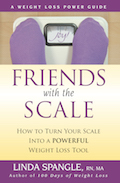 Over the past years, you’ve probably heard lots of conflicting advice. Throw the scale away. No, wait! Weigh yourself every day. No, that’s not right either. Never weigh yourself at all.
Over the past years, you’ve probably heard lots of conflicting advice. Throw the scale away. No, wait! Weigh yourself every day. No, that’s not right either. Never weigh yourself at all.
In the field of weight loss, you’ll find plenty of controversy about using the scale. Lots of books and program leaders take an extreme approach and say, “Throw it away! Never weigh yourself again.” Sometimes, you’re told, “The scale is evil, and it will ruin your weight-loss efforts.”
Other sources take the opposite view, suggesting you should weigh yourself regularly, perhaps daily. Many researchers encourage dieters to use the scale as a critical part of any weight-loss program as well as during maintenance. In fact, a number of studies have shown that daily weigh-ins, along with a consistent support system, result in the best long-term outcomes.
So which one is correct? Throw the scale away or step on it every day? Actually, this question doesn’t have a right or wrong answer, and either of these choices can bring success. It comes down to learning which approach is right for you as well as recognizing the behaviors that get you into trouble.
The Scale Quiz
Here is a simple quiz that will help you identify which scale category fits you best. It will also give you a future roadmap for healthy ways to manage your scale.
Based on what you think or do most of the time, respond to each statement with one of the following:
1=Yes 2=No 3=Sometimes
• The scale determines my mood for the day.
• My self-esteem is often connected to what the scale says.
• I take the scale along when I travel.
• Thoughts about my weight dominate my day.
• I frequently talk about my weight or my diet plan.
• I have a history of anorexia or self-starving.
• I have a history of bulimia, or binge eating, then purging the food.
• If my weight is up, I exercise a lot more to make it go back down.
• When my weight goes up, I punish myself with exercise or an eating binge.
• I weigh myself multiple times a day.
• I can’t resist stepping on the scale at the gym or in a friend’s bathroom.
• If I see a scale, I feel compelled to get on it.
• I punish myself verbally or mentally when the scale goes up.
• I blame the scale for my weight-loss failure or my regaining weight.
• Frequently the scale reading makes me want to eat more, not less.
Once you complete the quiz, count the number of responses you have in each category. Here’s how to interpret your score.
1= If you have mostly “yes” answers, you may need to throw your scale away.
2= If you have mostly “no” answers, you can safely keep your scale.
3= If you have lots of “sometimes” answers, keep your scale and work on changing your approach to it.
Unless you clearly fit into the toss-your-scale category, you can probably retrain yourself around using it. By working on your thoughts and behavior patterns, you can change your response to the scale and learn to manage it in healthier ways.
Changing Your Thoughts
After years of struggling, Cindy was ready to let go of her obsession with her scale and her weight numbers. We worked on a plan for how often she would weigh herself as well as ways to manage her thoughts and fears around the scale.
After she’d been using her new approach for a few months, Cindy called to tell me how it was going. Here’s what she said:
A few days ago, I got on the scale and saw the number was up a couple of pounds. In the past, I would have panicked and immediately looked for ways to cut more calories out of my day. But fortunately I heard your voice reminding me that it’s just a number.
That helped me respond calmly and keep trusting myself and my new approach. Now I know that regardless of what the scale says, I will continue to follow my healthy eating and exercise plan and stay focused on my program.
Your scale’s readout doesn’t predict your weight- loss success. It’s just a number that most likely will be different tomorrow. It says nothing about your future or your ability to reach and maintain a healthy weight in the years ahead.